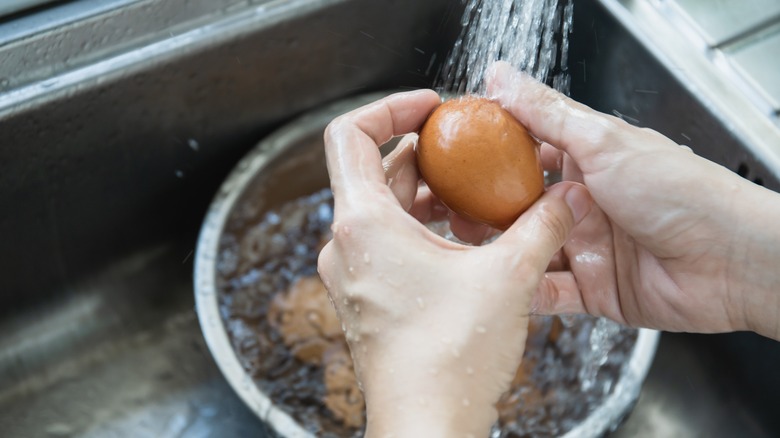Is It Safe To Store Eggs At Room Temperature? The USDA Explains
Eggs have become expensive, so you might be spending more time thinking about them than you ever have before. You might dream of owning your own backyard flock and building up an egg stash. Or you might stock up when you catch them on sale. And if you've made your way over to the farm fresh side of TikTok, you may have noticed that some people keep their eggs on the counter. So, you're starting to wonder if you can, too.
The answer about refrigerating your eggs isn't as simple as it would seem. Several factors, like washing and bacteria, come into play. And it has nothing to do with the cleanliness of your coop — but the laying process of the eggs themselves. The United States Department of Agriculture (USDA) has strict regulations in the U.S. for eggs to ensure that bacteria can't harm the population.
Learn the why behind refrigerating your eggs from the store or market, and discover when it might be okay to keep your eggs at room temperature. After all, it's always essential to keep the facts straight when adding more eggs to your diet.
Washed and sanitized eggs should be refrigerated
There are federal guidelines for how you should handle and store fresh eggs from the farmer's market and the grocery store. The USDA says that eggs from the market or store should be refrigerated, since these eggs are washed before being sold. Salmonella bacteria is the reason that you need to make sure to keep your washed eggs refrigerated.
The USDA states that Salmonella bacteria can be found outside the eggshell because it exits the hen through the feces passageway. So, the eggs are washed and sanitized within a processing plant. Consumers must keep their eggs refrigerated to ensure that the bacteria doesn't continue to grow. Nutrition expert Toby Amidor, R.D., told the Food Network, "Eggs that have just been laid by hens should be refrigerated immediately. In addition, Salmonella is a concern, and this bacteria does like to multiply at room temperature."
This is why the government has strict regulations on eggs, requiring those for purchase to be washed and refrigerated below 40 degrees Fahrenheit. Anything higher could allow the bacteria to multiply.
Refrigerated eggs can't be left out for long
If your eggs got left out on the counter for a while, you might wonder if you should chuck them in the trash. According to the USDA, the answer is yes — you shouldn't leave your refrigerated eggs out for longer than two hours. So, if it's been longer than that, you won't want to risk it.
Once the eggs are laid, they are washed and sanitized according to Food and Drug Administration (FDA) guidelines. The shell has a protective (cuticle) coating on it that's removed. Amidor notes, "This thin layer acts to protect the shell of the eggs and helps minimize bacteria getting into the pores of the shell, and helps prevent Salmonella from getting into the egg" (via. Food Network). With the pores exposed, the tiny bacteria could wreak havoc on the part of the egg that you consume. The USDA also notes that Salmonella Enteritidis bacteria can infect the yolk and white before the shell is formed if it's already in the hen's system.
The USDA stated that the groups most susceptible to illness from consuming raw eggs are young children, mature adults, pregnant individuals, and anyone with a weakened immune system. There are a lot of benefits to eating eggs, though, so you may not want to take them out of your diet. Therefore, it's essential to cook your eggs all the way through.
Unwashed eggs do not require refrigeration
The United States requires refrigeration for eggs. However, not all countries require their eggs to be washed. You might also notice that backyard farmers also do not wash their eggs. The Iowa State University's The Livestock Project stated that unwashed eggs can be kept on the countertop for weeks without spoiling. This is a common practice in many areas.
However, Purina Animal Nutrition, LLC notes that if you have the availability of refrigeration, you should use it. Refrigerating unwashed eggs can make them last much longer than a few weeks. And even if you don't wash your eggs, you'll want to keep your pens clean to avoid contamination on the eggs when they are laid. Brush off any fecal matter from the eggs before storing them. Remember to do a float test on eggs before eating them by putting them in a bowl of water. Fresh eggs always sink, while rotten eggs float.
The USDA states that eggs should always be refrigerated to keep bacteria in check. However, unwashed eggs could be left at room temperature for a few weeks without spoiling. If you're unsure, refrigerating your eggs is a safe bet.




